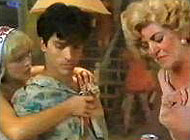|
|
|
|
Welcome
to Woop Woop
|
 |
|
Few Australian films arrive with such forbidding word of mouth as Welcome to Woop Woop. I was told by numerous sources before seeing it that it was very possibly the worst Australian feature ever made – a trophy for which it faces some stiff competition. Its distributor seemed a little nervous about releasing it to the world. And it is directed by our maestro of artlessness, Stephan Elliott (Priscilla, Queen of the Desert, 1994). Against all expectations, I have to report that Woop Woop is not really so bad. It is a much better directed film than Elliott's previous efforts – with a welcome consistency of tone and energy. And on the level of its content – a wild, vulgar romp through popular myths of Australian nationalism and identity – it is surely the most gruesomely fascinating local product since Yahoo Serious' Reckless Kelly (1993). Like many previous local films, Woop Woop places an American in the heart of "wild" Australia, and plays out an allegory of international relations. Teddy (Johnathon Schaech), an American crook, flees to Australia and lands in the arms of highly sexed Angie (Susie Porter). Teddy then finds himself a prisoner of Woop Woop – a community ruled by the iron fist of Daddy-O (Rod Taylor). Every inhabitant of this hellish, in-bred place is a screeching grotesque who charmingly incorporates "fuck me dead" into every other sentence. Only the angelic Krystal (Dee Smart) – a virgin married to a gay hairdresser (Paul Mercurio) also abducted from the big city – dreams of escape to a better, more civilised life. Woop Woop constantly threatens to become a grandly incoherent mess. Its most basic premises often make precious little sense. For a movie nominally so obsessed with Australianness, it is bizarrely American in many respects. The central story of Teddy and Angie derives more from L'il Abner than any local legend. The townsfolk's obsession with Rodgers and Hammerstein musicals – they seem to have their own private cinémathèque devoted solely to the genre – takes on intriguingly cultish proportions. Their reaction to such imported pop culture is puzzling: they seem to be simple, innocent, outback folk, but they behave like camp connoisseurs straight from the inner city. But it is when we get to the central topic of the film – its attitudes to a changing Australia – that the feathers really start flying. One mind-warping soliloquy – in which Daddy-O stands up for his love of the dry land that even Aborigines disdain, and excoriates those hideous bureaucrats who would take it away from him – sounds for all intents and purposes like the battle hymn of the retrograde One Nation movement. Is this Elliott's self-proclaimed political incorrectness spitting in our civilised faces? Perhaps, but then his film does a complete U-turn. More and more, it presents "old" Australia – patriarchal, mono-cultural, nostalgic, homophobic – as a fascistic abomination (a little like Bartertown in Mad Max Beyond Thunderdome [1985]), a way of life that has reached its historical use-by date. As strange as it sounds, by the end, Woop Woop is clearly aiming to flatter the trendiest, multicultural leftie in the house. And, in its mad way, it is admirable precisely because of this desperately opportunistic about-face. MORE Elliott: Eye of the Beholder © Adrian Martin August 1998 |
![]()